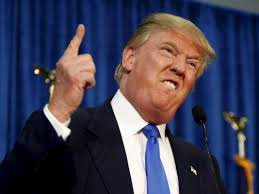Posted on July 31,
2018
Confu$ion
Does trump understand how money works?
by
Daniel
Clark
There’s no denying that Donald Trump is a very
successful businessman, but does he truly understand money?
At a breakfast with the NATO secretary general in
Brussels, Trump called out our allies for not living up to their defense
spending commitments. “Many countries
owe us a tremendous amount of money for many years back, where they’re
delinquent, as far as I’m concerned, because the United States has had to pay
for them.”
All NATO member states have agreed to spend at least
two percent of their GDP on national defense, but few of them have done
so. That’s money they’ve agreed to spend
internally, however, on their own defense budgets. They do not owe it to us, nor does NATO
manage a common fund to which its members contribute. Still, the president has made variations of
this claim several times before. In
March, he tweeted that “Germany owes vast sums of money to NATO & the
United States must be paid more for the powerful, and very expensive, defense
it provides to Germany.”
 The
United States spends on our defense whatever our elected representatives decide
we do. Germany doesn’t owe us a cent for
that. Yet there’s our
Commander-in-Chief, sounding like Johnny Friendly from On the Waterfront, demanding that each of the supposedly delinquent
nations pay up.
The
United States spends on our defense whatever our elected representatives decide
we do. Germany doesn’t owe us a cent for
that. Yet there’s our
Commander-in-Chief, sounding like Johnny Friendly from On the Waterfront, demanding that each of the supposedly delinquent
nations pay up.
Meanwhile, Trump is saying the U.S. is overspending on
our military, but are we? He didn’t seem
to think so in his State of the Union Address, when he said, “We know that
weakness is the surest path to conflict, and unmatched power is the surest
means of our defense. For this reason,
I’m asking Congress to end the dangerous defense sequester and fully fund our
great military.” Those don’t sound like
the words of somebody who thinks our defense spending ought to be commensurate
with that of Germany.
Then again, maybe they do. For no sooner did he secure this funding than
he sought to divert it elsewhere, daffily declaring
that “our Military is rich again,” and could therefore spare the funds to build
a border wall. Of course, that
expenditure would only be temporary, because Mexico is going to reimburse us
for the wall. “They can pay for it
indirectly through NAFTA,” Trump sort-of explained to The Wall Street Journal. “We
make a good deal on NAFTA, and say, I’m going to take a small percentage of
that money and it’s going toward the wall.
Guess what? Mexico’s paying!”
 There
is no possible renegotiation of NAFTA that might result in a payment by the
Mexican government to the U.S. Treasury, so what money is he talking
about? The answer lies in Trump’s
generally distorted view of trade, by which a nation with which we have a trade
deficit owes us an amount of money equal to that deficit. “Our trade deficit ballooned to $817
billion,” Trump said, while overstating the deficit by $249 billion during a
faux-campaign event in Illinois. “Think
of that. We lost $817 billion a year
over the last number of years in trade.”
There
is no possible renegotiation of NAFTA that might result in a payment by the
Mexican government to the U.S. Treasury, so what money is he talking
about? The answer lies in Trump’s
generally distorted view of trade, by which a nation with which we have a trade
deficit owes us an amount of money equal to that deficit. “Our trade deficit ballooned to $817
billion,” Trump said, while overstating the deficit by $249 billion during a
faux-campaign event in Illinois. “Think
of that. We lost $817 billion a year
over the last number of years in trade.”
Likewise, he believes our trade deficit with Mexico
represents money “we lost” to that country.
Therefore, if a new NAFTA lowers the deficit between the two nations,
that represents a payment from Mexico to build the wall. The absence of actual money is unimportant.
“Trade deficit” is a misnomer. When two parties freely engage in an economic
transaction, they set the value of that which is traded. If you pay Walmart $700 for a TV, then you
receive a $700 TV in return. There is no
deficit. Walmart owes you nothing.
Americans, being the most prosperous people in the
world, are bound to buy more in imported goods than anyone else. If all tariffs and other trade barriers were
removed, we would inevitably maintain a significant trade deficit. Would that be a bad thing? The president seems to think so.
If, on the other hand, his trade war suppresses trade
so that American exports and imports are both cut in half, our trade deficit
would be halved also. Would that be a
good thing? The president seems to think
so.
Now, Trump has struck an agreement with the European
Union, which he says might lead to a mutual elimination of tariffs on
industrial goods, but why? If he stops
imposing high tariffs on Europe, there will be no mechanism to lower our trade
deficit with the EU by minimizing our commerce with it. How, then, could Germany ever repay us for
its NATO commitments?
The Shinbone: The
Frontier of the Free Press